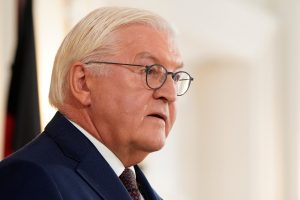BERLIN—There is one thing Friedrich Merz ’s friends and foes agree on: The man is impatient. So impatient that he occasionally flies himself to private meetings in his own plane, according to an aide.
Despite that, he has waited nearly 20 years for his chance to lead Germany. Now the stars appear to be finally aligning for the hobby pilot to get that chance.
The center-right Christian Democratic Union, which Merz has chaired for the past two years, is far ahead of its rivals in opinion polls. Barring a huge upset, the 69-year-old is on track to become chancellor after the general election in February—seven months ahead of schedule because of the collapse of Chancellor Olaf Scholz ’s strife-ridden coalition.
A win would give Merz the daunting task of rebuilding a German economy that hasn’t grown since 2019. And it would establish him as Europe’s main counterpart to U.S. President-elect Donald Trump .
“When a president and a chancellor begin their terms at about the same time, it’s a clean slate and a good opportunity to improve the relationship,” said Jens Spahn , a senior CDU lawmaker, former minister and member of Merz’s leadership team.
A Roman Catholic from Germany’s industrial Rust Belt, Merz became a German lawmaker three decades ago. He left politics in 2009 for a business career that made him a multimillionaire and the owner of a Diamond DA42 propeller plane, which he learned to fly.
A lawyer by training, he was a partner at law firm Mayer Brown and later chairman of BlackRock Germany. He served stints on the boards of some of Germany’s largest companies: Commerzbank , chemical giant BASF , Deutsche Börse and others.
His private-sector experience and wealth would make him an unusual chancellor. The country’s previous leaders were mostly career politicians or hailed from modest backgrounds.
As chancellor, Merz’s priority would be to establish a good rapport with Trump. Scholz hosted President Biden in Berlin days before the election and trumpeted his friendship with the departing U.S. leader. Merz doesn’t carry such baggage.
A former chairman of Atlantik-Brücke, an organization that promotes U.S.-German relations, Merz even met Trump many years ago when he was still a property developer, according to his spokesman.
Merz didn’t speak publicly then about his impression of Trump. But in a radio interview days before the 2016 U.S. election, Merz called Trump’s debate performance against Hillary Clinton “completely out of control.” On Jan. 6, 2021, he tweeted: “Trump, it seems, isn’t a democrat.”
Some Republicans now close to Trump have said worse things about him in the past, and Merz has been circumspect about Trump since. In an interview this week, he said he would aim to strike mutually advantageous trade and defense deals with the incoming president.
“I have a long business experience with the U.S. I think I can understand how Americans work,” he told Stern magazine. “I observe Trump. I speak with many people who know him very well.”
Germany has much to lose from a Trump plan to impose 10% to 20% tariffs on most U.S. imports. The embattled economy is highly dependent on exports.
Merz would approach the U.S. administration immediately after his election with offers for deals on tariffs and defense, said Spahn, who attended the Republican convention this summer.
Trump’s team “won’t be swayed by talk alone, but they are open to deals and they respect economic strength,” said Spahn.
He and others close to Merz said he would also coordinate his outreach closely with Germany’s European partners inside and outside the European Union—something Scholz was often criticized for neglecting.
Fixing Germany’s broken economy will be the next chancellor’s biggest challenge.
High costs, flagging global demand and increased competition from China have hurt German manufacturers, which have seen their output drop continuously since 2017. Many have announced big job cuts. Unemployment, though still low, is beginning to rise.
Publicly, Merz has been more critical of China than Scholz and Merkel. He has urged German companies to reduce their dependence on the world’s second-largest economy. Beijing is “behaving increasingly repressively at home and aggressively abroad. China is becoming a serious threat to our security,” he told a German newswire in April.
While Scholz called for bailouts and subsidies to save jobs and prop up struggling carmakers, Merz wants lower taxes, less bureaucracy and measures that would make it cheaper for businesses to reach Berlin’s climate goals. The country’s largest business organizations have said they prefer his pitch.
A fiscal conservative, he has defended the country’s strict spending rules, which left-of-center parties would like to suspend to unleash more spending. But Merz has also signaled openness to reforming those rules in a way that would favor investments over welfare spending.
One question mark hanging over Merz’s prospects is his temper. Some critics see his impulsiveness as his worst enemy. A civil servant who worked in parliament in the 1990s says Merz would often lose his cool and say things he later regretted.
Some of these outbursts have been public. Last year, he faced a backlash after saying on a talk show that rejected asylum seekers were “sitting at the doctor, having their teeth redone, while German citizens can’t even get an appointment.” He has apologized for saying that some unemployed Ukrainian refugees in Germany were engaging in “social tourism.”
A spokesman for Merz disputed that he is known for losing his temper. Merz told a German podcast earlier this year that he was sometimes prone to exaggerations but he found comments about his lack of self-control unfair. He said people who describe him as overly impulsive don’t really know him.
As parliamentary leader, he has reached out to rivals and brought them into his leadership team. “Merz is an engaged listener, but he’s also a leader. He’s interested in what others think, but he also knows decisions must be made,” said Spahn. “People want political leadership and that’s what he stands for.”
Despite his private-sector background, Merz is anything but a political novice. A CDU member since 1972, he was elected to the European Parliament in 1989 and to the German parliament in 1994. He later rose to become the party’s parliamentary leader but lost the job in 2002 to Angela Merkel after a yearslong power struggle.
This history contributed to his image as a political figure of the past. So did his positions when they were unfashionable in Germany in the early 2000s. He is pro-business, advocates for small government and lower welfare spending as well as strong military and security services, and he wants to reduce immigration.
By the time he returned to politics in 2018, the CDU was in the throes of a backlash against Merkel’s centrist chancellorship, during which she banned nuclear power, ended military conscription, increased welfare benefits and welcomed nearly two million refugees into the country.
Since his return to politics and election as CDU chairman, Merz has pulled the party back to the right. This has energized the base and boosted the CDU’s ratings by 10 points to around 34%.
Merz’s ascent to the chancellery isn’t a done deal. One obstacle is his personal popularity, which lags behind that of his party. A Forsa Institute poll for broadcasters RTL and NTV published this month showed a quarter of respondents would want to have him as chancellor, 10 points behind center-left Defense Minister Boris Pistorius , now Germany’s most popular politician.
“I don’t know if Merz has changed, but voters haven’t changed their minds about Merz,” said Manfred Güllner, president of Forsa. “They still see him as competent but unsympathetic.”
In the German system, parties, not people, compete in the general elections. Still, given the government’s unpopularity, the CDU should be more popular, Güllner said. Should the SPD dethrone Scholz and field Pistorius as their candidate, Merz might not sail into the job so easily.
And even if his party wins, his staunch rejection of any alliance with the nativist AfD means he would need to enter a coalition with at least one center-left group, maybe two, to secure a parliamentary majority.
The man who can’t wait would have to reach compromises, make concessions and rule by consensus to keep his government together—something his U.S.-centric business career might not have prepared him for.
Write to Bertrand Benoit at bertrand.benoit@wsj.com










